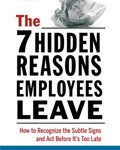Employee productivity management is normally seen as a manager’s job, and that might be a good thing. Recent research has shown that some managers can achieve up to 10% increases in productivity among their staff.
In the video below I discuss this phenomenon and what it means for HR professionals and business leaders. I also talk about a book that has some crossover between the research on employee productivity management and how it actually played out in another study of manager impact on employee engagement, performance, etc. The third piece I discuss is a philosophy of author/speaker that HR’s last great unexplored frontier is employee productivity and how to get more from our staff. I think that’s a key piece of why engagement has become the hot buzzword in recent years (it sounds cooler than employee productivity management), but they both mean basically the same thing: how can we get more work out of our people for the same amount of money?
If it was an easy answer, we’d have answered it already. The book that I talk about in the video covers some amazing concepts for how to develop a culture of belief that is so strong that it drives employee engagement and profits. I highly encourage you to check it out if that’s something you are interested in.
Check out the video and let me know what you think!
Employee productivity management show notes
- Here’s a link to the employee productivity management research discussed below: link
- If you want to learn more about Dale Dauten, here’s are links to two articles I wrote about him previously: How to Kill the Status Quo and Ten Rules to Work and Live By
- Here’s the book review for All In: Building a Culture of Belief that I referenced in the video. I comment in the article on the Red/Green experiment, so check that out if you would like to learn more.
- Here’s the direct link on YouTube if you can’t see the embedded video (subscribers, click through)
So, what do you think? How can HR professionals best impact employee productivity?
Want more? Check out the free employee performance management guide!
 I don’t have cable. I watch 1-2 shows online, but I’m otherwise not enslaved to the TV. Recently when visiting my wife’s parents’ home I caught a few minutes of an episode of Undercover Boss. It was an interesting show, but when it got to the end and the CEO started making decisions, I realized again how common this specific management mistake really is.
I don’t have cable. I watch 1-2 shows online, but I’m otherwise not enslaved to the TV. Recently when visiting my wife’s parents’ home I caught a few minutes of an episode of Undercover Boss. It was an interesting show, but when it got to the end and the CEO started making decisions, I realized again how common this specific management mistake really is. Quoting from Part 1 of this series as a refresher:
Quoting from Part 1 of this series as a refresher: Recently a friend pointed me to an article discussing A players, B players, and C players. I had some differing thoughts when I read it, and I’m going to break it down and discuss a few different parts of the article that need addressing.
Recently a friend pointed me to an article discussing A players, B players, and C players. I had some differing thoughts when I read it, and I’m going to break it down and discuss a few different parts of the article that need addressing. So you made a bad hire. Lesson learned. Eventually it happens to everyone.
So you made a bad hire. Lesson learned. Eventually it happens to everyone. We need the right people sitting in the right seats.
We need the right people sitting in the right seats.